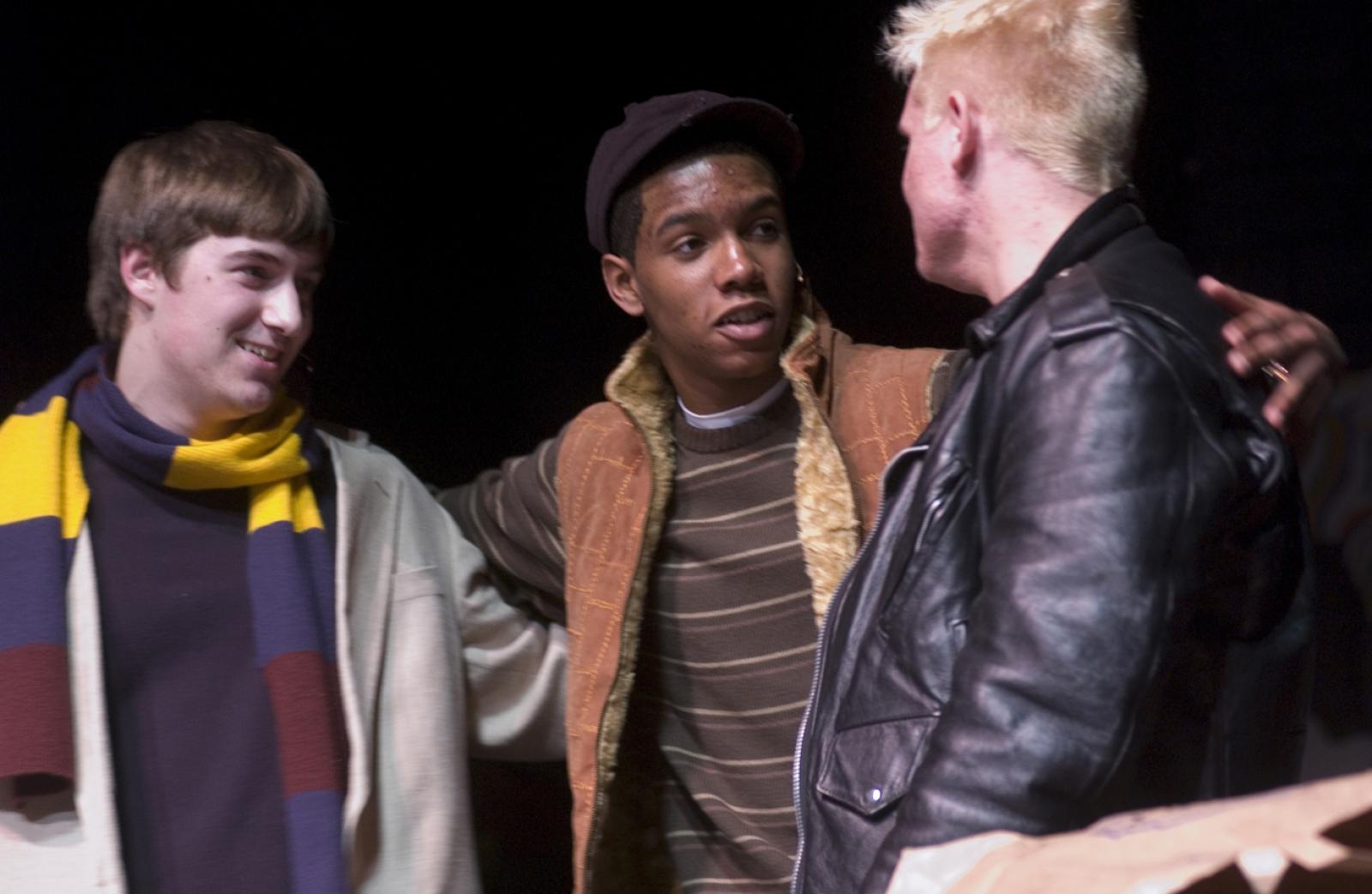There is really no way to write a conventional high school musical review about a project that is not a conventional high school musical. So if that’s what you’re looking for, stop reading now.
But first things first: the evening was enormous fun, the talent extraordinary and the energy infectious (if one may safely use that term to describe a play that is largely about living with AIDS). The Martha’s Vineyard Regional High School theatre department took on an enormous challenge, and outdid itself. On many levels, the mounting of this show was courage made manifest.
On a practical level, it’s simply a heck of a play to produce. The production demands are daunting, the enormous cast is asked to do some things probably out of their comfort zone, and the belting, rock-out style of music requires a level of vocal control few teenagers have developed. It’s not like singing Oklahoma or My Fair Lady.
I was impressed by the quality of all the performers’ voices; there were great pipes up there. Sidra Dumont (Joanne) in particular stands out. However, these are mostly rock songs, intended to show off attitude, rather than show tunes intended to show off vocal beauty. The singers were all so good, I wished they had more opportunities to simply sing (a talent they all clearly have) rather than belt (a talent most of them are still developing). That said, Katie Mayhew (Mimi) and Hannah Marlin (the understudy Maureen, and soloist in Seasons of Love) are both sensational sopranos, handling the vocal challenge with effortless panache. And when the entire ensemble sang together, it was breathtaking, gorgeous and uplifting.
Rent also challenges its actors’ acting chops. The characters are street-savvy, cynical New Yorkers. Although most of them are hardly older than the actors portraying them, their life experiences are much rougher and grittier than that of an Island high school student. The cast is existentially more innocent than the characters they’re playing. It was heartening to see student actors being given such a serious challenge, and taking it on with such gusto. Katie Mayhew, Nick Jerome (Mark), Austin Gampfer (Roger), Alex Roan (the smarmy Benny), Rykerr Maynard (Tom Collins) and Tessa Permar (Maureen) were all completely committed to their roles — and so was every other member of the cast, from the squeegiemen (Mitch Lowe and Katie Johnson) to the parents (Emile Lowe, Taylor Perrotta and Ashley Gwynn).
Everyone on stage was playing somebody so far removed from their own identity, it was an extraordinary opportunity for character work, and in the end a stunning success. I’m not sure I’ve ever seen a professional company so invested in their work; I’ve certainly never seen a high school cast so absolutely focused and present.
Special kudos have to go to Taylor Rasmussen as Angel Schnuard, the bighearted drag queen who dies of AIDS near the end of the play. It was a revelation to see a teenage boy so comfortable in his own body — not to mention platform heels. Mr. Rasmussen has incredible stage presence, and the loving relationship between Angel and Tom Collins is the sweetest thing in the show.
Rent is also a doozy to pull off technically, and here too the theatre department did itself proud (with the help of a number of community members, who were called to the stage in thanks after the final performance). The lighting, sound, set, scenery and costumes all achieved that perfect balance of being so exactly right that they never gratuitously called attention to themselves. The large technical and running crew were the unsung heroes of the evening.
But the challenges Rent raises are not just theatrical, and the courage called upon to stage the play is not limited to students honing their craft. There is also the matter of the play itself.
News of this production stirred some controversy. The Broadway smash hit Rent, a modern riff of Puccini’s exquisite opera La Boheme, is a dirty, nasty, gritty exposé of life in Alphabet City (the eastern extreme of the East Village), Manhattan, circa 1990. The story is one that some parents would hesitate to let their high-school-aged children see, let alone perform in. Most of the main characters have AIDS; one leading couple is gay, another couple is lesbia n-bisexual and deeply dysfunctional; Mimi, the only heterosexual female lead, is a drug addict and (ahem) exotic dancer. The language is vulgar throughout, and the behavior often is, too.
In 2007 a modified version of the script, called Rent: School Edition, was released to a few high schools. It tones down the language (and body language) and plays down (perhaps almost too much) Mimi’s addiction and profession.
But it’s still Rent.
Last year, at least three intended high school productions around the country were canceled because of protests, either by parents or school administrators, about the play’s moral and thematic issues. However hip and progressive the Vineyard likes to think of itself, we’re still a small, rural community with a lot of traditional values. Theatre program director Kate Poole Murray’s choice of this play speaks loudly about her faith in both her students and the community, and in both cases her faith was well-founded.
Because while the play may be set in a disease and drug-infested urban dystopia, it is fundamentally a story about a community of people with shared values, trials and experiences, who celebrate together, mourn together, support each other’s differences and come together in touching, meaningful, generous and loving ways to get through the hard times.
How could that message be objectionable, or even alien, to anyone who lives on the Vineyard?








Comments
Comment policy »